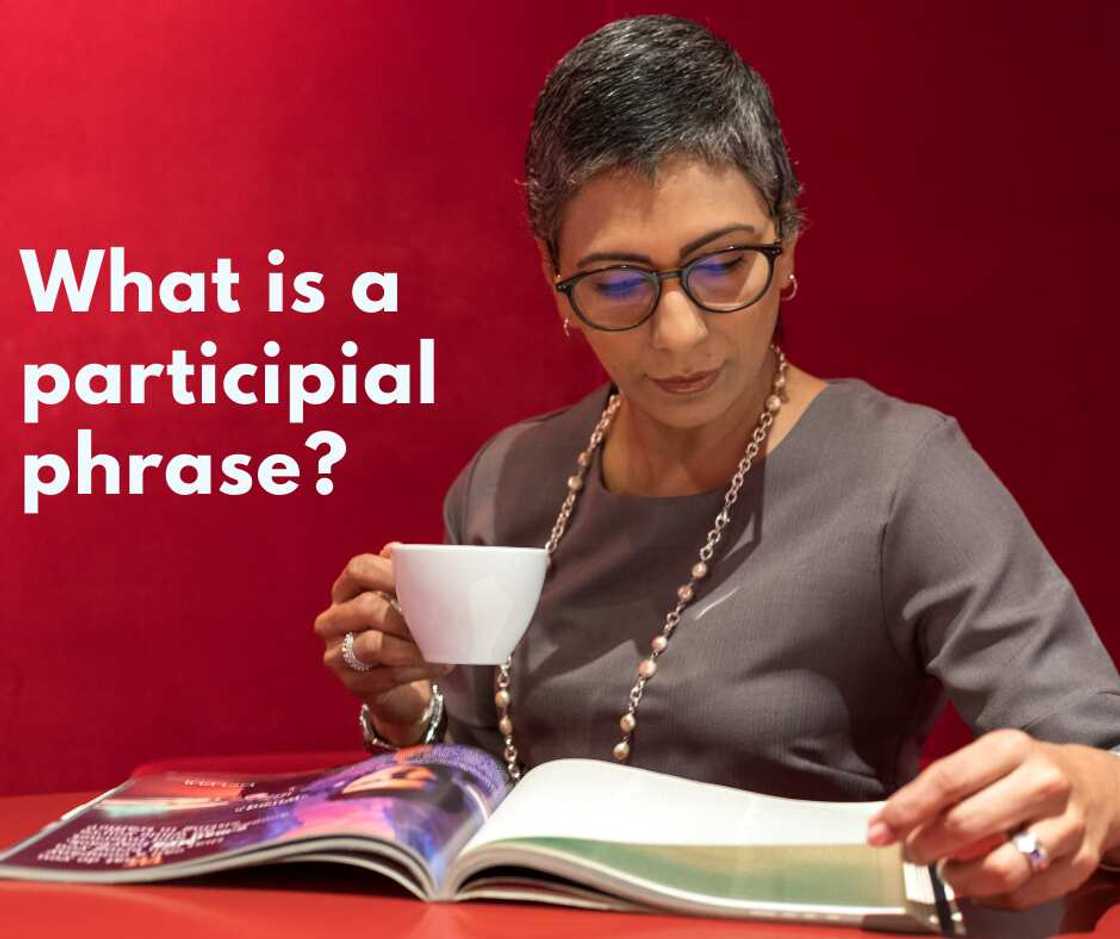What is a participial phrase: definition, common uses, examples
Do you know what a participial phrase is? For a while, this topic as an area has largely been discussed among numerous learners. Even though it seems like it is a common thing, and occurs in most sentences you read in novels or magazines, most people do not understand what it is.

Source: UGC
A phrase is a group of words that work together to make meaning. However, it is not a complete sentence because it does not have a verb and a subject. There are seven types of phrases in the English language. Therefore, to differentiate this kind of phrase from the rest, you will be required to know the participial phrase definition, and a couple of examples of how they are used.
What is a participial phrase?
This is a group of words that appears like a verb but works as an adjective. It slightly alters the sentence structure, and it is used to provide added descriptions of what the subject is doing or what it looks like.
They are commonly used in pieces of literature, whose objective is to tell readers a lot in a few words, for example, in newspaper articles and fiction books. Their purpose is to act as adjectives - they modify nouns and pronouns.
Parts of participial sentences: How do they look like?
A participial phrase has various parts. It starts with a participle and then includes other modifiers and direct objects (or subject complements).
A participial phrase = a participle + other words
a. A participle
What is a participle? A participle is a word derived from a verb that is used as an adjective, and most often, it ends in (-ing) or (-ed).

Source: UGC
These types of words can either be categorised as a present or past participle.
Present participles
They indicate the action of a verb, especially in the present. They always end in (-ing).
Past participles
This category is divided into regular and irregular. The regular ones end with (-ed), while the irregular ones do not end with (-ed). Examples of irregular past participles include hung, taught, and sung.
b. Other words that form participial phrases
A participial phrase example will also contain a modifier and sometimes a noun.
1. What is a modifier
Like it's name puts it, it is a word that modifies a noun. A modifier adds more description to a phrase, and it can be used in participial phrases to describe more of the situation.
Modifiers can be adjectives, adverbs, or even participles, as long as they modify a noun.
Example of modifiers;
- Hurriedly opening the bag, Kennedy found his favourite notebook.
The word 'hurriedly' in the above sentence is a modifier. It tells you more about how the subject - Kennedy opened the bag. However, the whole phrase describes how he found his notebook.
2. Noun
Sometimes a noun can also be used, but depending on the participle. Some participles will make more sense with a noun because it adds details to the sentence.

Source: UGC
Below is an example of how a noun can be used in a participial phrase sentence.
- The phone was almost out of battery power, blinking in the dark.
'Blinking in the dark' describes the noun phone. This is how these phrases work because they always modify the subject of the sentence.
Blinking might make sense on its own in another sentence, but not in this particular one. Accompanying it with the noun 'dark' gives you a better understanding of what is going on.
Now, consider the same sentence without the noun 'dark'.
- The phone was almost out of battery power, blinking.
It looks a bit funny because it is not clear what is blinking and why it is blinking. The sentence appear incomplete without the words 'in the dark'. Therefore, to prevent such situations and give additional details, these phrases will sometimes use nouns.
What are participial phrases examples?
Having looked what's a participial phrase, plus the parts that form it, then a few examples here will help you gain a better understanding. Below are some of the examples of participle and participial phrase in the sentences.
Example one;
- Removing his coat, Derrick rushed to the river.
The participial phrase (removing his coat), in this case, functions as an adjective modifying the noun - Derrick.
To break it further, (removing) is a present participle, while (his coat) is the direct object of action expressed (removing).
Example two;
- Cooking his own dinners for a year, Joseph managed to save over 500 USD.
Joseph is the subject in this sentence. In most cases, subjects are the first thing you meet in a sentence, but participial phrases mix things up a little bit. They offer unique details even before you see the subject.

Source: UGC
In the sentence, (cooking his own dinners for a year) is a participial phrase. Within it is a present participle - cooking.
What to consider when using participial phrases
There are two crucial factors you should put in mind when writing these phrases. Interestingly, if you don't, then you will end up sounding ambiguous. They include punctuation and placement.
1. Punctuation
When you begin a sentence with this phrase, a comma should be placed immediately after it. Consider the sentence below.
- Running through his to-do list, John realises he is in for a very long day.
If the phrase comes in the middle of a sentence, then it should be set out with commas only if the information is not essential to the meaning of the sentence.
- The church, destroyed by a fire, was never rebuilt.
2. Placement
A participial phrase must be placed as close to the modified noun as possible. This will help prevent confusion.
Consider the following sentences.
- Carrying a heavy pile of books, he caught his foot on a step.
- Carrying a heavy pile of books, his foot caught on a step.
The word 'foot' here refers to the subject. In the first case, it is far away from the participial phrase. As a result, the sentence is a bit confusing because there is no clear indication of who or what is performing the action expressed in the participle 'carrying'.
This is an excellent example of a dangling modifier error. The modifier, in this case, is not modifying any specific subject; instead, it is left dangling. As a result, the sentence is ambiguous. Placement is, therefore, important.
What is the difference between participial and gerund phrases?
These two groups of words are easy to confuse, considering that they begin with (-ing). However, their difference is like day and night. Unlike the participial, which functions as an adjective, a gerund works as the subject of a sentence.
Below is an example of how a gerund can be used in a sentence.
- Jamming too much clothing into a washing machine will cause a disaster.
'Jamming too much clothing into a washing machine' is a gerund phrase; the subject of the action verb will cause.
With much information covered in this article, we hope that any conflicting ideas about a participial phrase can now be put to rest. The numerous examples here will help you gain a better understanding on the topic.
READ ALSO: 10 functions of literature everyone should know about
Legit.ng also published an article on ten functions of literature everyone should know about. Literature means the desire of people to convey their own knowledge, experience, vision through written texts.
Other than knowledge sharing, communicating, and entertainment, literature has other numerous functions.
Source: Legit.ng







